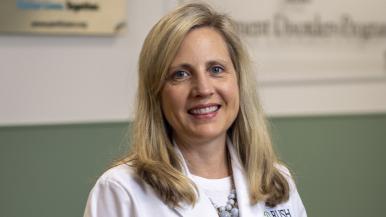The symptoms and progression of Parkinson’s disease vary in each person diagnosed with the condition. Now, thanks to research breakthroughs related to genetics, we are beginning to understand the biological reasons why.
Even more exciting: Work steered by multiple researchers at RUSH is fueling the development of promising new treatments informed by new knowledge about the genetic underpinnings of Parkinson’s.
“This is a dramatic change in the Parkinson’s disease landscape — reminiscent of what has happened in cancer treatment over the past several years,” said Deborah A. Hall, MD, PhD, director of the RUSH Parkinson’s Disease and Movement Disorders Program and The Parkinson’s Foundation Chair of Neurological Sciences. “Ten years ago, we would not have necessarily offered gene testing to most patients. Now we do so, not just to improve our diagnoses but to open doors for patients to specialized therapies based on their underlying gene mutations.”
RUSH and the worldwide search to uncover the genetic links to Parkinson’s
Scientific endeavors such as the Human Genome Project have helped researchers uncover dozens of genes associated with Parkinson’s disease, with more genetic links regularly being discovered. Current estimates suggest that about 15% of Parkinson’s disease cases are associated with a known genetic mutation.
The most ambitious research effort to date was launched in 2021. The Global Parkinson’s Genetics Program, or GP2, is a collaboration among nearly 100 research groups around the world formed to understand the genetic architecture of Parkinson’s disease by studying the genomes of more than 150,000 volunteers.
RUSH University Medical Center is a key member of GP2, contributing genetic information from hundreds of consenting patients so far. Many of the samples RUSH investigators have collected and sequenced are through studies funded by philanthropy.
“Our research in genetics simply would not be possible without support from donors,” said Dr. Hall, who is an investigator on GP2 research studies.
The emerging connection between genetics and disease
The most rapidly advancing studies and clinical trials are focused on the two most common genes associated with Parkinson’s in the U.S.: GBA1 (glucocerebrosidase 1) and LRRK2 (leucine-rich repeat kinase 2). These and other genes have been shown to increase buildup of alpha-synuclein, the protein that becomes deformed and aggregates in the brains of people with Parkinson’s.
Somewhere between 5-10% of people with Parkinson’s disease are estimated to have a mutation to the GBA1 gene. Studies show these patients are more likely to experience disease onset earlier in life. A higher prevalence of cognitive challenges and nonmotor symptoms has also been documented among patients with GBA1-associated Parkinson’s disease.
Therapeutics emerging in the past few years — designed specifically for people with these types of gene mutations — provide cause for optimism. RUSH is a site for many of these initial clinical trials.
“What we’re hoping is that these personalized treatments will be game-changing in slowing progression of the disease by targeting the biological pathways being impacted by gene mutations,” Dr. Hall said.
Genetic counselors: Critical members of the Movement Disorders team
Experts in neurogenetics are quick to underscore the complexity of research findings. Just because someone has a gene mutation associated with a higher risk of Parkinson’s disease doesn’t automatically mean they will get the disease or pass it on to offspring. Genetic counselors play an essential role in explaining the complex results of genetic tests to patients.
“We gather information from patients, relatives and caregivers about personal and family history of disease and provide education about the risks, benefits, costs and limitations of genetic testing,” explained Marc Rosenbaum, MS, RUSH’s certified genetic counselor. “Genetic counseling visits provide the opportunity to discuss complex genetic information before and after pursuing genetic testing, which can also include a review of genetics-related and gene-specific research studies and clinical trial opportunities for conditions like Parkinson’s disease and other movement disorders.”
RUSH’s program hired a full-time genetic counselor several years ago, and orders for gene testing and recruitment into trials for patients with specific gene mutations continue to grow. Compared with other movement disorders programs, RUSH’s program is still ahead of the curve in having a genetic counselor so deeply embedded in the care team, said Dr. Hall, who credited donors for their support.
“These exciting developments urge us to recommend gene testing for the patients who come to our clinic,” Dr. Hall said. “I’m confident these advances in genetics are moving us closer to discovering the holy grail in Parkinson’s disease research — slowing down progression of the disease.”
Shaping a new discovery in people of African descent with Parkinson’s
Current findings related to Parkinson’s disease genetics are limited by the fact that most studies have relied on data from people of European descent. Research into the gene changes that may cause Parkinson’s in Black and African American people is a knowledge gap in the field — a gap RUSH researchers are working to fill.
Dr. Hall is a co-investigator on a team of researchers leading the Black and African American Connections to Parkinson’s Disease Study, or BLAAC PD, for short. With an enrollment target of 600 participants, it’s the largest-ever study of its kind.
Just this August, the research group made national headlines when it published findings in The Lancet Neurology. The team discovered a variant of the GBA1 gene found almost exclusively in people of African descent. Those who carried a single copy of the gene were about 50% more likely to develop Parkinson’s. People with two copies saw their risk increase by nearly 400%.
“This discovery offers hope that we can develop therapies specifically targeting this genetic variant found in people of African descent with Parkinson’s disease,” Dr. Hall said. “This is the promise of precision medicine in neurology, and it’s only the tip of the iceberg.”




